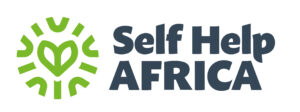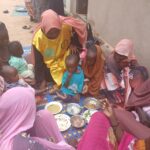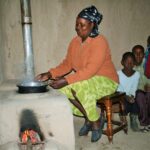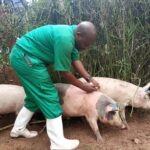Improving harvests for 200 farmers and their families in Zambia
Feb 2015Self Help Africa
Charity Partner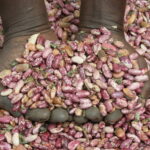
Estimates of food insecurity and malnutrition indicate that Africa still has one of the highest proportion of undernourished people in the world. Zambia is one of the world’s poorest countries and ranked 163rd out of 187 on the Human Development Index with life expectancy at 49.4 years (UNDP, 2013). Poverty and food insecurity are widespread in both rural and urban areas, and the country remains extremely vulnerable to recurring natural disasters, including floods, drought and animal diseases. Standard national statistics for malnutrition levels amongst under-fives are 5 percent wasting, 15 percent underweight and 45 percent stunting (Central Statistics Office, Lusaka, Zambia., 2007). The paradox though is that Zambia is endowed with abundant arable land and water resource potential.
In Kafue and Chirundu districts in Lusaka Province and Chinkakata district in Southern Province, farmers are challenged by very low rainfalls of less than 800mm and short crop growing periods. Their lack of good quality bean seed also contributes to low yields.
Their yields can be less than one quarter the national average. Yields of their staple food source, maize are also very low, meaning that families have less than two meals a day for long periods of time.
Farmers certainly don’t have enough maize or beans to sell and therefore standards of living are poor and families cannot afford to send their children to school.
Self Help Africa works with farming communities to provide better seed, training in more sustainable agricultural techniques and simple tools to improve yields
Empowering small farmers with better agricultural technologies, inputs, market access and new income opportunities, through partnerships and knowledge sharing, can increase system productivity and sustainability, while at the same time reducing risk and vulnerability.
This project will therefore support 200 farmers to receive improved bean varieties (Kabulangeti variety) and be trained in sustainable farming techniques with the aim to increase their production of crops by 60% and improve household incomes by at least 80%.
Self Help Africa helps people in rural Africa grow enough food to feed themselves, earn a living, and access basic services. Self Help Africa equips people with the skills they need to move out of poverty by training farmers in new techniques and teaching basic business skills. Be One Percent via Self Help Africa have supported tree nurseries, planting over 8000 trees and set up Microfinance initiatives providing 12,000 women in Uganda with savings and small business loan facilities.
